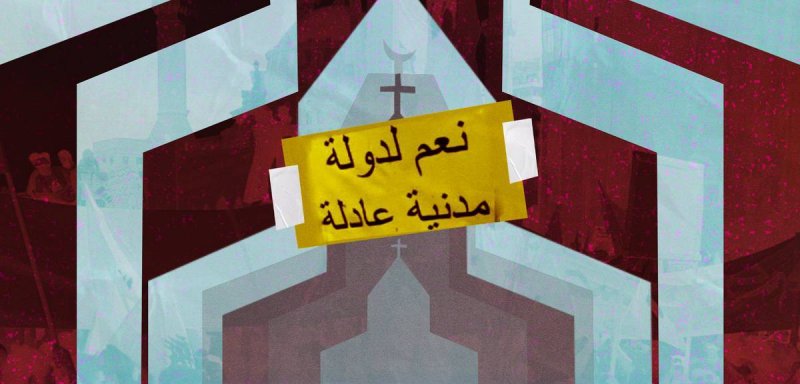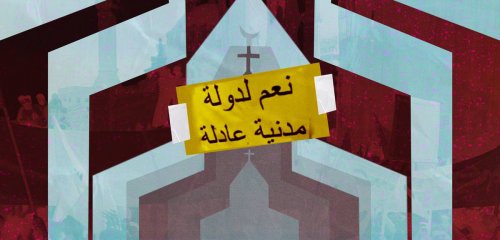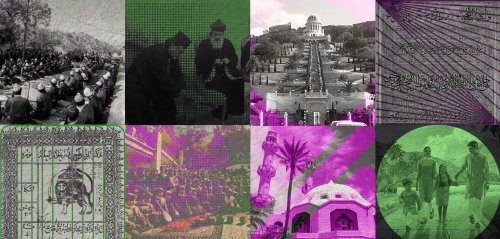“I do not want to be affiliated with any sect, party, or religious institution”, “I believe in a system of rule based on spreading a culture of social justice”, and “As a woman, I demand a unified law that protects women's rights and freedoms instead of personal status laws”. These three sentences are quotes from a group of young women and men who disclosed them during a round of interviews conducted by the author of this report in different regions in Lebanon, specifically in Khalde and separate areas in the Bekaa, Ashrafieh, Dahieh (the southern suburbs), and neighborhoods in the capital Beirut, in response to a question about how much they agree with or oppose the Lebanese state.
In addition to the answers that were in favor of the idea of a ‘civil state’, there were a number of comments against it, with one of the responses stating that "the sheikh in the mosque said that a civil state contradicts our religion, identity, and traditions," while another commented that "a civil state doesn’t resemble our thoughts and ideas, as it follows Western ideology."
The Druze are the most supportive of a civil state, while the Sunnis are the least
As part of the Model Youth Parliament project (YMP), the Adyan Foundation's Rashad Center for Cultural Governance asked about an optional civil code for personal status laws. According to the results of the survey conducted in the first half of June last year, which included 1,800 voters between the ages of 18 and 35, 52.9% of whom were males and 47.1% were females, the adoption of an optional civil code in Lebanon received overwhelming approval by the Druze community at 81.2%, Orthodox Christians supported the law by 73.7%, and Maronite support was at 76.3%. Support decreased among survey respondents from other sects, with 55% of Shiites supporting the law, with the lowest level among the respondents being the Sunnis, with only 34.9% supporting the law.
The adoption of an optional civil law in Lebanon received high approval from the Druze community at a rate of 81.2%
Several civil society associations, including KAFA (Enough) Violence & Exploitation, see "a civil state as a priority because it does not violate citizens' rights like sectarian laws," according to Fatima Hajj, a lawyer at the association. On the other hand, some leaders and members of the political class in Lebanon suggest that they are among the most prominent advocates of a civil state, but there are many controversial issues about the concept of a civil state and its relationship to religious freedoms.
One of the most prominent concepts that stand as an effective barrier against the adoption of the civil state by some, especially religious institutions or bodies, is that it is considered to be contradictory to religions, and that it follows the example of Western countries that contradict the beliefs, ideas, traditions and customs of Middle Eastern societies. Some may even go as far as to accuse those who call for a civil state of blasphemy, or accuse them of trying to obliterate the Arab identity.
The difference between a civil state and a secular state
What is a civil state? And what is the difference between a civil state and a secular state? Aida al-Jawhari, a writer and researcher with a doctorate in linguistics, said that “the term ‘civil state’, which has become popular in Arab political discourse since the outbreak of Arab revolutions and uprisings in the last decade, does not exist academically in the lexicon of political science,” explaining that “the most accurate term is secularism, which is the thought that adopts the principles of democracy, public freedoms, separation of powers, independence of the judiciary, human rights, social justice, equal opportunities, equality and citizenship.”
Constitutionally, does Lebanon adopt a civil system? Constitutional law professor and lawyer Antoine Sfeir answers by saying, “According to the provisions of the constitution, there are no constitutional articles that oblige Lebanon to adopt a specific religious system or religious law as a source of legislation, nor articles that refer to the adoption of a specific religion for the state or the head of state, and according to this, Lebanon has a civil system,” adding that “Lebanon is a civil state and not a secular one. The latter separates religion from state institutions, while a civil state respects religious rites, and their diversity, as well as religious freedoms.” Sfeir bases his opinion on Article 9 of the Lebanese Constitution, which states that: “Freedom of conscience (belief) is absolute. In assuming the obligations of glorifying God, the Almighty, the State respects all religions and creeds and safeguards the freedom of exercising the religious rites under its protection.”
On the other hand, Elie al-Hindy, Executive Director of Adyan Foundation, indicates that the reason for using the term ‘civil state’ instead of ‘secular’ in Lebanon is due to "fear of backlash or unwillingness to imitate specific secular regimes.”
The Civil State... The enemy of religion?
Al-Hindy points out, "The secular state has no problem with religion or religious manifestations as long as clerics have no authority over political decision-making, as it separates religion from power but does not abolish religions.” He provides a realistic example; the United States is “one hundred percent a secular country, but we find a great role for evangelicals in managing policies and directing people, and this applies to the Catholic Church and Jewish lobbies, and recently there have been manifestations of an Islamic presence."
The secular state has no problem with religion or religious manifestations as long as clerics have no authority over political decision-making, as it separates religion from power but does not abolish religions
He adds, "As religions, we do not support the restriction of religion to homes on the principle of rejecting religious bias or neutrality, which is what France did during the French Revolution between 1789 and 1799, by overthrowing the monarchy, churches, and any religious manifestations”. He goes on to say that "the reality indicates that individuals vote according to their faith, and politicians make their decisions according to their values, principles, and faith, so the correct perspective lies in managing religious diversity.”
For her part, researcher Katie Nassar points out that "there is a positive secularism and a negative one. The positive one defends religious freedoms, while the negative one tends to exclude and does not open the way for religious manifestation." In response to a question about those who propagate the view that a civil state is the enemy of religion, Nassar, who holds a PhD in Islamo-Christian studies, replies that they’re “everyone who has an interest in us remaining in a sectarian state, that is, those who have interests to perpetuate clientelism and political sectarianism in Lebanon.”
The International Information Company, a Beirut-based research, studies, and statistics company, conducted a survey between November 29 and December 14, 2019, that included a proposal to ban any religious expressions or symbols in public places in Lebanon. 53% of the participants rejected the proposal (including 19.9% strongly rejecting it), 27.3% approved the proposal, and only 8.4% expressed their strong support of it, while 19.5% neither supported or opposed the survey proposal that was implemented as part of the Model Youth Parliament project.
Support for an optional civil law was least among the Sunnis, with only 34.9% supporting it
The Civil State.. and religious freedoms for women
Al-Hindy talks about the problem of women's associations refusing to sit at the same table with clerics, calling for “opening a dialogue with religious, spiritual, Jaafari and Sharia judges to achieve some gains in favor of women and their freedoms."
For her part, Attorney Al-Hajj asserts, "We do not conduct dialogue with sects or clerics because our battle is with the state that gave them privileges and authority, but we support women by accompanying them to religious courts and by compulsorily adhering to the 15 personal status laws imposed by each sect when pursuing their cases.”
She adds that "there are common interests between clerics, heads of sects, and politicians, that impede and hinder any law that protects or frees women from religious restrictions," noting that "when we submitted the draft law on the protection of women from domestic violence to parliament, they decided to pass the law to religious institutions before even commenting on it."
Al-Haj concludes by saying, “Our battle continues to demand civil laws that safeguard the interests of citizens on the basis of equality, rights, and religious freedoms.”
For her part, Lebanese MP Halimé Kaakour, says, “I myself call for secularism the most, but the type of secularism that we call for is the one that tolerates symbols and religious freedoms together," explaining that "secularism in France tolerates religious freedoms, not symbols, as it is against wearing the veil in public places but it is not against the presence of mosques and churches, unlike Britain, which tolerates any form of religious symbols, and this is the type of secularism that protects religious freedoms in general, and women’s religious freedoms in particular."
There are common interests between clerics, heads of sects, and politicians, that impede and hinder any law that protects or frees women from religious restrictions
Al-Hindy says that as a result of the prevailing trend in Lebanon to prioritize the interests of sects at the expense of citizens' rights and freedoms, Article 9 of the Lebanese Constitution is now being applied at the expense of other articles, and as a result, problems have emerged, including that each sect has its own laws, like personal status laws, in addition to the fact that the state approves laws that conflict with religious freedoms, such as preventing veiled women and not letting them enter the judiciary, which contradicts Article 95 of the constitution, which stipulates: “The principle of confessional representation in public service jobs, in the judiciary, in the military and security institutions, and in public and mixed agencies shall be canceled (abolished) in accordance with the requirements of national reconciliation; they shall be replaced by the principle of expertise and competence. However, Grade One posts and their equivalents are exempt from this rule, and the posts must be distributed equally between Christians and Muslims without reserving any particular job for any confessional group or sect, but rather applying the principles of expertise and competence.”
Aida al-Jawhari points out that “when it comes to the secular experiences witnessed by the countries of the world, among their priorities was the protection of religious freedoms, including the freedom to practice rites and rituals, under the supervision of states," adding that "women are the main beneficiaries of the adoption of secular laws instead of the adoption of personal status laws, which discriminate between one Lebanese and the other, and lead to discrimination against women and perpetuate their inferiority."
Feminist activist Mariam Yaghi agrees with al-Jawhari, saying that "women will not obtain their rights unless there is a secular state that is equal to all male and female citizens, and does not discriminate on social, sexual, partisan, religious or sectarian grounds, and therefore the existence of this state would improve the conditions of citizens in general, and women in particular."
Raseef22 is a not for profit entity. Our focus is on quality journalism. Every contribution to the NasRaseef membership goes directly towards journalism production. We stand independent, not accepting corporate sponsorships, sponsored content or political funding.
Support our mission to keep Raseef22 available to all readers by clicking here!
Interested in writing with us? Check our pitch process here!






